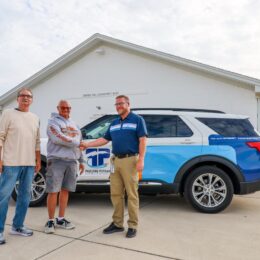
GEORGE
CARTER
It simply means your cooperative will provide education, training, and information to members, elected officials, employees, and the general public to ensure a greater understanding of the cooperative and its mission. The magazine you are reading is an example of this principle of education.
There is a saying which goes back to the original formation of electric cooperatives over 80 years ago. It says: “Cooperatives were born in politics, and they’ll die in politics.” Rural electric cooperatives are small by their very nature and don’t have the same leverage politically as big investor-owned utilities (IOUs). However, electric cooperatives serve 42 million people and distribute power across 75 percent of the landmass in this country, so politics become very important when these numbers are considered.
These two principles are the reasons for the cooperatives’ annual pilgrimage to Washington, D.C., to meet legislators. Each year, thousands of cooperative representatives descend on our nation’s capital to bring your message to those we have elected. Your cooperative representatives speak for you and our rural concerns to ensure we are not left behind.
This year, Board Chairman John Saxton, Board Vice-Chairman Steve McMichael, and I attended the National Rural Electric Cooperative Association Legislative Conference. We had great opportunities to discuss rural issues with our elected officials from Ohio and Indiana.
One of the main topics we brought to their attention was the need for access to capital dollars for rural infrastructure. The Rural Utilities Service (formerly the REA) provides most of the capital used by electric cooperatives. This is done through the Loan and Loan Guarantee Program. This is not a federal subsidy program — it actually returns a profit to the federal government. By providing this needed capital, cooperatives can upgrade and improve electric facilities for members, and rural towns and municipalities can improve water and sewer services. It is important that our elected officials understand the immense capital needs of rural America and recognize that rural America provides a return to the federal government through these loan programs.
While there, we brought many topics to the attention of our legislators. One important item they mentioned was the support from cooperative members. They know that when we are there, we are representing you — rural voters. They also understand that your support for ACRE Co-op Owners for Political Action® means financial support is coming from thousands of co-op members contributing small amounts. They know the difference between your financial support and that of big corporate donors.
You are heard in Washington, D.C., because our elected officials know we represent you, the co-op members.
GEORGE CARTER is CEO/general manager of Paulding Putnam Electric Cooperative.



